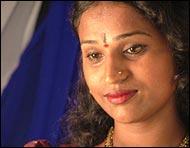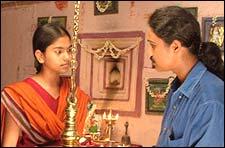|
|
| Help | |
| You are here: Rediff Home » India » Movies » Reviews |
|
| |||||||||||||||||||||||
|
| |||||||||||||||||||||||
 At a time when Tamil cinema was just about getting out of the influences of theatre, movies used to open with one of the lead actors introducing the rest of the cast.
At a time when Tamil cinema was just about getting out of the influences of theatre, movies used to open with one of the lead actors introducing the rest of the cast.
This redundant intro would be done over scenes that would depict exactly what the narrator is talking about.
Santosh Sivan's Navarasa begins with, and ends with, one of these narrations by the bright 13-year-old lead character Swetha (Swetha).
It is through her young eyes that we see this movie about the third gender.
Santosh Sivan: Why I made Navarasa
Here's how:
Swetha discovers that her uncle Gautam (Kushboo) has a thing for wearing her jewellery and dressing up like a woman.
She confronts him and is told that he wants to live life as a woman. He tells her of a myth about eunuchs. That eunuchs are reincarnates of Lord Krishna, who, during the war between the Kauravas and the Pandavas in the Mahabharata, took the form a woman, Mohini, for a greater cause.
He also tells her that he wants to go to Koovagam, which hosts an elaborate and unique festival of eunuchs every year.
Swetha understands none of this. Gautam takes off to Koovagam and she follows him in an attempt to convince him to come back.
From here on it is one hell of a discovery for the 13-year-old.
 Sivan belongs to that category of filmmakers who do not have an agenda -- no messages, no solutions. He just shows. Like in The terrorist where he just showed us the final days of a suicide bomber without taking any stand on the issue, Sivan records the Koovagam festival here, apart from showing how a girl who just has just about begun to understand her own sexuality understands the third gender.
Sivan belongs to that category of filmmakers who do not have an agenda -- no messages, no solutions. He just shows. Like in The terrorist where he just showed us the final days of a suicide bomber without taking any stand on the issue, Sivan records the Koovagam festival here, apart from showing how a girl who just has just about begun to understand her own sexuality understands the third gender.
So, for those who already know about the Koovagam festival (or for that matter don't want to know about it) there is very little in the movie. It doesn't show any of the problems the eunuchs face -- the social stigma, the pain of being ostracised, having to struggle for a living and having to face ridicule all their lives.
Navarasa aims to work at two levels. At one level, it shows how Swetha comes to grips with her uncle's sexuality and at another, it sits back and records the Koovagam festival as a documentary would.
It is this documentary part that does the movie in. Swetha's tale is the more interesting one. But every time it draws you in, the documentary part sets in and kicks you out as though telling you, 'Stay away! This is a movie about the third gender. Watch their gaudy beauty pageant, watch them soliciting, watch their rituals.'
And even though the movie starts off exploring the relationship between Swetha and her uncle, this part of the plot is totally sunk in the din of the festival.
The two reunite at the fag end of the festival and the journey from thereon till the climax is a breeze.
It is the 15 minutes when her parents are let into the truth. Swetha goes up to her father, who had been conveniently out of town for the three days when the story is set, and asks what eunuchs are.
'They are women trapped in a man's body,' the dad booms, and even goes on to quote Rabindranath Tagore.
She then breaks the news to him. By the time she has told him the uncle has been up to this and this and this, dad's got a leather belt tightly wound in his hands.
They both go into Gautam's room, and in between a bit of drama there, we get to see what is probably the most important part of the film.
Swetha tells dad, 'You know what your problem is? He (Gautam) loves to lie to you and you love to believe it.'
The crux of the problem of eunuchs is that while in most cases, of, say, cancer or even AIDS in these days of awareness, the battle is against society. The family, to an extent, stands by the victim's side. With eunuchs, home is where the battle starts and, for most, ends.
Though Santosh Sivan has a brilliant premise (a middle-class family, a 13-year-old and a eunuch) with which it could have explored the travails of the third gender, Navarasa remains just a faithful chronicler of a myth.

|
|
| © 2008 Rediff.com India Limited. All Rights Reserved. Disclaimer | Feedback |